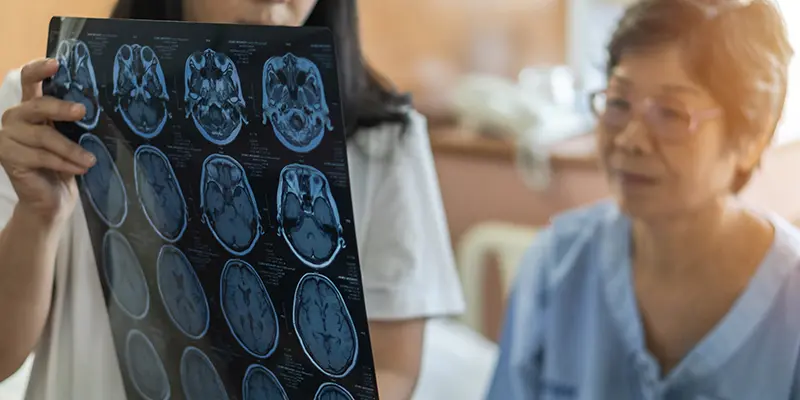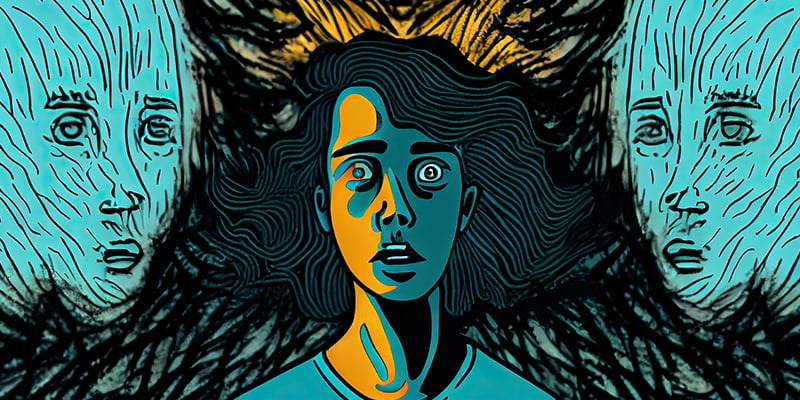
Many of us are exposed to trauma during our lives, whether we experience it first-hand or witness a frightening event. It is common for people who live through trauma—such as a natural disaster, car accident, physical assault, or mass shooting—to develop symptoms associated with posttraumatic stress disorder (PTSD).
Since our brains are wired to alarm us to the presence of danger, having a physical and psychological response to trauma is normal. But when the distressing feelings don’t diminish over time, it can lead to PTSD. Approximately 1 in 30 U.S. adults suffer from this condition. When left untreated, PTSD can ruin lives and even lead to suicide.
There are many things you can do to help treat symptoms of PTSD.
5 Ways To Help PTSD
1. Know The Symptoms
When people think about PTSD, they often think about flashbacks or distressing memories, but these are only some of the symptoms associated with the condition. There are many other symptoms associated with PTSD that can easily be mistaken for other issues.
Symptoms of PTSD include:
• Intense recollections, such as flashbacks and nightmares
• Inability to recall certain aspects of what happened
• Avoidance of people, places, or things that are reminders of the event
• Distressing memories
• Inability to stop thinking about the incident
• Increased or excessive anxiety
• Always being on guard or “jumpy”
• Feeling emotionally numb
• Problems with sleep
• Anger and irritability
• Depressive symptoms
• Social isolation
2. Learn From Success Stories
Many PTSD sufferers have successfully minimized their symptoms and are enjoying their life again. Sometimes hearing how someone else lived through a traumatic event can reduce feelings of isolation and shame, while offering reassurance and hope. Listen to U.S. Marine Denny’s journey of healing here.
3. Support Your Brain Health
It’s important to understand that having symptoms of PTSD is not a character flaw or a sign of personal weakness. Brain imaging shows that PTSD is a biological problem in the brain. Supporting your brain with healthy habits, including good nutrition, exercise, supplements, and meditation can help. You can hear more about how to enhance your brain health to help you overcome PTSD here.
4. Use Proven Therapies
Scientific research shows that certain therapies can reduce symptoms of PTSD and improve brain health. Three of the most effective treatments are neurofeedback, cognitive behavioral therapy (CBT), and eye movement desensitization and reprocessing (EMDR). Studies show that neurofeedback significantly reduces PTSD symptoms, CBT has been found to reverse the underlying biology of the disorder within the brain, and EMDR is especially helpful for people who have experienced abuse.
On brain SPECT scans, the pattern of PTSD typically reveals over-activity in multiple areas of the brain, which is often referred to as the “diamond plus pattern.” This high activity tends to keep the brain on overdrive, increasing anxiety and irritability and interfering with sleep.
SPECT Imaging of PTSD Before & After Treatment
 |
 |
BEFORE Treatment |
AFTER Treatment |
5. Get An Accurate Diagnosis And Treatment With A Brain Scan
Unfortunately, most doctors never look at the brain with imaging, so people with PTSD often go undiagnosed or are misdiagnosed and given the wrong kind of treatment. Advanced brain imaging technology provides an objective measure of PTSD, which leads to a more accurate diagnosis and more effective treatment. Brain SPECT imaging shows people with PTSD that their symptoms and behaviors are biological, not mental, which helps eliminate the shame and guilt people feel and encourages healing.
At Amen Clinics, we use leading-edge brain imaging technology to help identify PTSD in the brain. Our comprehensive brain-body approach to treatment involves the least toxic, most effective strategies to heal PTSD, including natural supplements, nutrition, exercise, neurofeedback, helpful forms of therapy, and medication (when necessary)—all personalized for your specific needs.
Don’t suffer from PTSD any longer. Call Amen Clinics at 888-288-9834 or schedule a visit today.






Our grown daughter has multiple issues. She has neurogenic bladder, ptsd, psychological problems, I think ADD. She had learning disabilities in school. She is on disability. She does not have a good life. She often does not want to go places. She is on Medicare and public aid. That is where the challenge rises . Any tips would be appreciated.
Comment by Miriam Knoy — August 17, 2018 @ 4:40 AM
I am sorry to hear about your Daughter’s issues but in my opinion, until she wants a different life she isn’t going to change anything.
Comment by Diane — September 28, 2018 @ 7:12 PM
Please send info on 16 brain types. Thank you!
Comment by Wendy — January 30, 2019 @ 6:29 AM
I am so sorry to hear about your daughter’s difficulties. I agree that she has to want a different life in order for things to change, however, there are a number of things you can do to help her through encouragement and modeling. The best way to learn how to do this is to seek advice from a qualified counselor. There are also a LOT of books out there with information about helping adult children. A 12-step program or group therapy with other women is an awesome way to brainstorm, identify unhealthy behavior in ourselves and learn from other’s experiences – and find people who understand.
I have a son who was on a similar path, and I learned that I could not help or influence him until I changed me. I had to learn what unhealthy patterns of interactions I needed to change (if you change how you behave, others have to change in response). Do you enable her in any way, by providing money or “rescue” her? Are you a healthy role model of how to handle life’s problems? Do you encourage her or nag her? Do you express love for her just the way she is? Have you owned and apologized to her any ways in which you have wronged her? We all hurt the ones we love, and even if it was unintentional, it needs an acknowledgement and an apology.
She may continue to make unhealthy choices, especially for a time, but you can’t control that. Working on yourself is where it all starts. For me, it was worth it. My son is now making some really good choices and is much happier. My other relationships improved, also. It is a very good feeling to work on me and let others work on themselves. There is no magic bullet, and all you can control is you.
Best wishes,
Carolyn
Comment by Carolyn — January 30, 2019 @ 11:57 AM
I’ve been seeing psychologist for years now spoke in great detail about my PTSD and she’s given me bubbles to put traumatic events in bubbles n let them dissapear as they burst. She also gave me a stress gadget you just twirl it its done nothing for my depression anxiety, self harming , being molested age 8 , violent household .Be as well dead tbh .
Comment by Gerald Corrigan — February 13, 2019 @ 12:26 AM
Miriam,
I deal with PTSD and find myself in a similar place as your daughter. Reading these comments is sort of upsetting because people don’t seem to understand that this “way of living” is by no means a choice. We are simply trying to make it through each day without our symptoms getting worse. All I would ask of my family, friends, and anyone who knows of my situation is to not blame me for how my symptoms affect me, to love me and support me, and to ask me questions carefully and considerately about how this illness is affecting me and my life without making assumptions that this is by some way a choice I’m making to be in this “dark place”. Ask your daughter how she’s doing here and there and ask her what she needs. Give her space when she asks for it. Don’t let her stay in her room for days without asking her if there is anything she would like you to do with her. She feels lonely and stuck. Afraid and disappointed maybe even with herself. Give her encouragement. And remember that’s all you can do and this is by no means your fault either. So many different aspects to this disease.
Comment by Erika — August 6, 2019 @ 4:52 AM
WOW! What a cold ignorant response this is. Completely assuming to know the WHOLE situation that this poor mother or the child is dealing with! Have you ever thought that something horrible and unspeakable could have happened to this child sometime in her life that even her mother or the rest of the family isn’t aware of? YOU DON’T know, but go ahead and throw your important self righteous opinion out there to beat the poor mother down even more. This is a totally unproductive response from a shallow minded person, for whatever reason!
Comment by Danielle — December 22, 2019 @ 6:00 PM